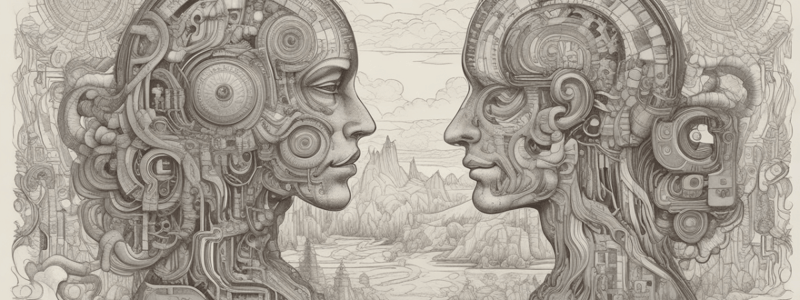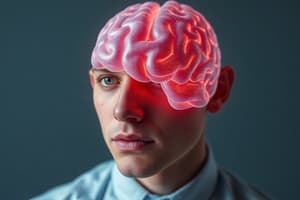Podcast
Questions and Answers
Match the types of memory with their definitions:
Match the types of memory with their definitions:
Recognition Memory = The ability to identify something encountered in the past Recall Memory = Bringing to mind something previously seen or experienced Relearning Memory = A strategy to improve memory through revisiting previously learned information Long-term Memory = The storage of information for extended periods
Match the cognitive functions of memory with their descriptions:
Match the cognitive functions of memory with their descriptions:
Coding = The process of converting information into a form that can be stored Storage = Retaining information for later retrieval Retrieval = Accessing stored information when needed Mental Time Travel = Reliving past experiences through memory
Match the types of memory retrieval with their characteristics:
Match the types of memory retrieval with their characteristics:
Recognition = Quick identification without deeper processing Recall = Retrieving memories from long-term storage Relearning = Facilitating future retrieval by revisiting information Retention = The ability to hold information in memory over time
Match these examples with the type of memory they illustrate:
Match these examples with the type of memory they illustrate:
Match the processes involved in memory with their roles:
Match the processes involved in memory with their roles:
Match the types of memory tasks with their functions:
Match the types of memory tasks with their functions:
Match these memory terms with their implications:
Match these memory terms with their implications:
Match the examples of memory use with their respective types:
Match the examples of memory use with their respective types:
Match the causes of forgetting with their corresponding descriptions:
Match the causes of forgetting with their corresponding descriptions:
Match the types of interference with their definitions:
Match the types of interference with their definitions:
Match the types of memory cues with their characteristics:
Match the types of memory cues with their characteristics:
Match the phenomenon with its description:
Match the phenomenon with its description:
Match the memory theories with their explanations:
Match the memory theories with their explanations:
Match the types of long-term memory loss with their causes:
Match the types of long-term memory loss with their causes:
Match the following types of memory encoding with their implications:
Match the following types of memory encoding with their implications:
Match the memory retrieval issues with their respective terms:
Match the memory retrieval issues with their respective terms:
Match the cognitive processes with their corresponding memory phases:
Match the cognitive processes with their corresponding memory phases:
Match the following memory concepts with their definitions:
Match the following memory concepts with their definitions:
Match the following memory improvement techniques with their descriptions:
Match the following memory improvement techniques with their descriptions:
Match the following types of memory with their characteristics:
Match the following types of memory with their characteristics:
Match the following mnemonic strategies with their methods:
Match the following mnemonic strategies with their methods:
Match the following practices with their effects on memory:
Match the following practices with their effects on memory:
Match the following aspects of sensory memory with their properties:
Match the following aspects of sensory memory with their properties:
Match the following terms associated with memory organization with their definitions:
Match the following terms associated with memory organization with their definitions:
Match the following components of memory improvement techniques with examples:
Match the following components of memory improvement techniques with examples:
Match the following types of memory with examples:
Match the following types of memory with examples:
Match the following conditions with their outcomes on memory:
Match the following conditions with their outcomes on memory:
Match the following types of memory with their definitions:
Match the following types of memory with their definitions:
Match the following memory features with their characteristics:
Match the following memory features with their characteristics:
Match the following stages of memory with their descriptions:
Match the following stages of memory with their descriptions:
Match the following memory categories with their types:
Match the following memory categories with their types:
Match the following memory characteristics with their properties:
Match the following memory characteristics with their properties:
Match the following types of memory with their examples:
Match the following types of memory with their examples:
Match the following definitions with the relevant memory terms:
Match the following definitions with the relevant memory terms:
Match the following memory processes with their explanations:
Match the following memory processes with their explanations:
Match the following memory retrieval factors with their functions:
Match the following memory retrieval factors with their functions:
Flashcards are hidden until you start studying
Study Notes
Memory Overview
- Memory is the cognitive function responsible for coding, storing, and retrieving information from our past.
- It allows "mental time travel," enabling recall of recent events or childhood memories.
- Memory facilitates daily tasks, skill application, and fact retention.
Memory Measurement
- Memory retention is evaluated through recall, recognition, and relearning:
- Recognition Memory: Identifying previously encountered information without detailed recall (e.g., "I saw that before").
- Recall Memory: Actively retrieving previously experienced information, such as book titles or friend names.
- Relearning Memory: Learning information again, leading to improved recall and usually requiring less time than the initial learning.
Causes of Forgetting
- Forgetting can occur for several reasons:
- Ineffective Encoding: Poor processing leads to harder recall; deeper processing enhances memory retention.
- Decay: According to decay theory, memory fades over time, affecting sensory and short-term memory, but long-term memory may remain intact.
- Interference:
- Proactive Interference: Old information disrupts new learning.
- Retroactive Interference: New information disrupts recall of old memories.
- Cue-Dependent Forgetting: Memory retrieval failures due to lack of cues, with types including semantic, state-dependent, and context-dependent cues.
- Absentmindedness: Low attention at encoding leads to misplaced items or appointments.
- Blocking: Temporary retrieval failure where a new memory interferes with recalling an older one, often leading to "tip-of-the-tongue" moments.
- Amnesia: Memory loss typically caused by damage in the temporal lobe and hippocampus.
Enhancing Memory
- Memory improvement strategies:
- Rehearsal/Practice: Frequent repetition aids retention.
- Overlearning: Continued study after initial mastery boosts retention.
- Minimizing Interference: Reducing similar material exposure enhances memory.
- Deep Processing: Engaging meaningfully with content leads to better retention. Utilizing elaboration can strengthen connections.
- Organizing Material: Hierarchical organization and chunking information aid memorization.
- Mnemonics: Utilizing acronyms, acrostics, and other memory aids enhance recall.
Types of Memory
- Sensory Memory: Holds unprocessed sensory information briefly, lasting 1-4 seconds.
- Short-Term Memory (STM): Processes and retains information briefly, lasting about 1 minute; relies on rehearsal for retention.
- Long-Term Memory (LTM): Has unlimited capacity, storing information for extended periods; primarily organized based on semantics.
Long-Term Memory Divisions
- Explicit Memory: Conscious memories easily verbalized, including:
- Declarative Memory: Facts and events, subdivided into:
- Episodic Memory: Personal experiences unique to the individual.
- Semantic Memory: General knowledge and meaning, such as facts from literature or events.
- Declarative Memory: Facts and events, subdivided into:
- Implicit Memory: Unconscious memory of procedures or feelings; includes:
- Procedural Memory: Skills and tasks performed automatically.
Stages of Memory
- Input Stage: Sensory organs perceive and transfer information to sensory memory.
- Attention Stage: Focused information moves from sensory memory to short-term memory for about 1 minute.
- Encoding Stage: New information is connected with existing knowledge to facilitate long-term memory formation.
- Storage & Retrieval: Organized and retained information can be later retrieved for use.
Studying That Suits You
Use AI to generate personalized quizzes and flashcards to suit your learning preferences.




